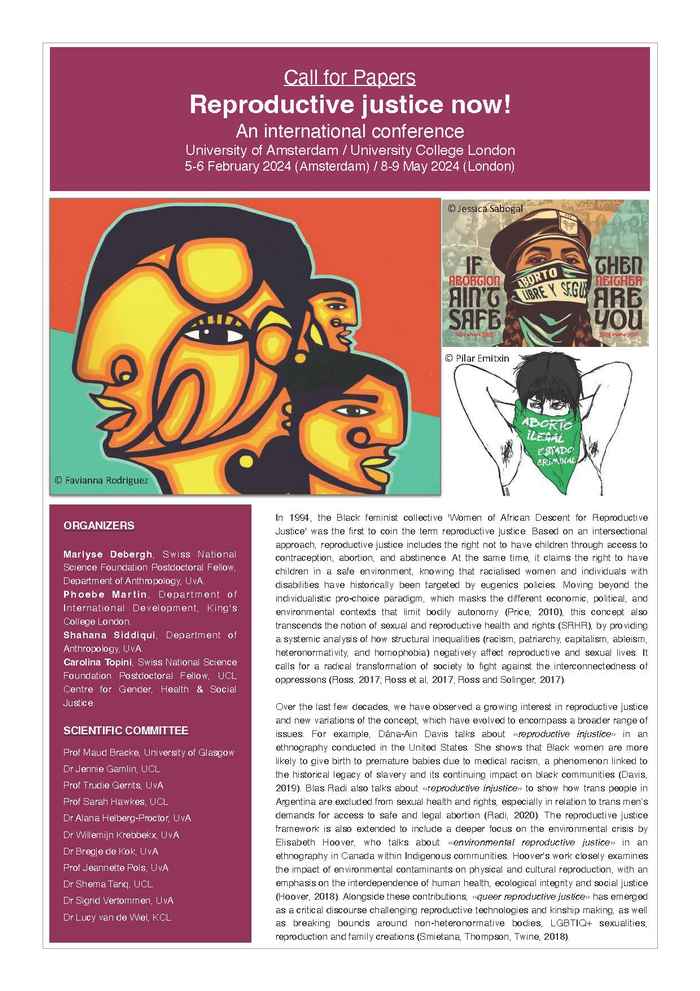Call for Papers: Reproductive justice now!
International Conference on Reproductive Justice
20 November 2023

Origins of Reproductive Justice: Unveiling Intersectionality in the Fight Against Structural Inequalities
In 1994, the Black feminist collective 'Women of African Descent for Reproductive Justice' coined the term reproductive justice, emphasizing an intersectional approach. It encompasses the right not to have children (access to contraception, abortion, and abstinence) and the right to have children in a safe environment, addressing historical targeting of racialized women and individuals with disabilities by eugenics policies. Beyond the pro-choice paradigm, it offers a systemic analysis of how structural inequalities (racism, patriarchy, capitalism, ableism, heteronormativity, and homophobia) impact reproductive and sexual lives, calling for societal transformation to combat interconnected oppressions (Ross, 2017).
Recently, variations like "reproductive injustice" (Davis, 2019), addressing medical racism's impact on Black women, and "environmental reproductive justice" (Hoover, 2018), exploring the link between environmental contaminants and reproduction in Indigenous communities, have expanded the framework. Additionally, "queer reproductive justice" challenges reproductive technologies and kinship making, embracing non-heteronormative bodies and LGBTIQ+ experiences (Smietana, Thompson, Twine, 2018). The concept continues to evolve, addressing a broader range of issues over the decades.
About the conference
While there is an increasing number of theoretical perspectives on the issue that shed light on new questions, there is a persistent lack of knowledge production on the practices of reproductive justice. What does reproductive justice mean in practice? How is it concretely integrated into research and activism and care? How do researchers and activists document women's health movements and reproductive justice activism?
The Reproductive justice now! conference aims to engage with reproductive justice practices, by bringing into conversation along feminist, transnational and intersectional perspectives. Co-sponsored by the AISSR Health, Care and the Body (HCB) programme group of the Department of Anthropology at the University of Amsterdam, the UCL Centre for Gender, Health & Social Justice, and the Department of International Development at King's College London, this two-part conference seeks to stimulate international and interdisciplinary exchange and new directions in scholarship on reproductive justice.
Taking place on 5-6 February 2024 in Amsterdam and 8-9 May 2024 in London.
Call for Papers
It welcomes multidisciplinary proposals (from sociology, anthropology, history, critical race theory, gender studies, epidemiology, etc.) including feminist historians, archivists, activists, artists, and experts working on aspects of reproductive justice. In particular, the following topics are welcome:
• Reproductive justice and intersectional feminist activism.
• Racism, population control policies and sterilization abuses.
• Feminist campaigns against harmful contraceptives and obstetric violence.
• Women traveling across borders to access abortion care and fertility treatment.
• Reproductive struggles of women living with HIV/AIDS.
• Reproductive struggles of people with disabilities.
• Anarcha-feminism and the struggle for reproductive rights.
• Late-term abortion politics.
• Maternal health inequalities and mortality in socio-economically disadvantaged communities and ethnic minority groups.
• Reproductive injustice and discrimination in health-care.
• Archiving reproductive justice activism
• Decolonizing sexual and reproductive health and rights
• Environmental reproductive justice.
• Queering reproductive justice.
Please submit 250-word abstracts and short biographies in Helvetica 11, 1 line, as a PDF file. Deadline: December 1, 2023.
Please indicate whether you prefer to present in Amsterdam or London. Please also note that we may not be able to accommodate your preference in order to ensure the coherence of the conference programme. We will also accept some online presentations.